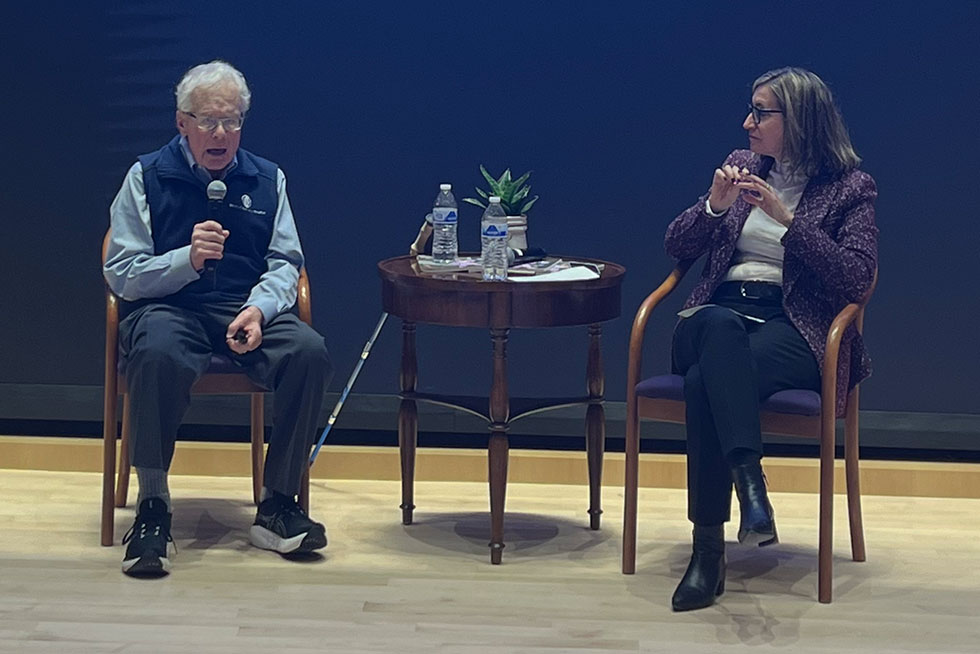
While his wife was visiting penguins on a trip to Antarctica, Harvey Lodish '62 H'82 P'89 GP'21 was busy talking science with students and faculty at his alma mater. He’s confident he made the right choice.
“I’m much happier here,” said the biotechnology entrepreneur and professor of molecular cell biology at the Massachusetts Institute of Technology, who is wrapping up two weeks of teaching on campus.
The emeritus Kenyon trustee, who has taught at MIT since 1968 and was a founder of its Whitehead Institute for Biomedical Research, has been guest lecturing in science classrooms, teaching a mini-course on biotechnology, and meeting with faculty. On Tuesday, he engaged in a Common Hour conversation with President Julie Kornfeld about biotechnology’s role in public health.
Lodish, who completed a similar residency over a decade ago, remains impressed with what he’s found.
“Kenyon does an excellent job in teaching biology, chemistry, molecular biology, ecology — all of this. The science faculty is superb,” he said. “And the students, as I’ve said to them, they’re as good as the MIT students.”
That’s high praise coming from a member of the prestigious National Academy of Sciences who wrote the book on molecular cell biology — his textbook is now in its ninth edition — and has had two trainees from his lab go on to win the Nobel Prize.
“They’re bright. They’re eager. They’re well-educated. They’ve all done serious research,” he said of the Kenyon students he’s met. “The subtext is that liberal arts colleges like Kenyon have and continue to produce leading scientists.”
Leaning on his own experience, Lodish credited the small classes, strong relationships with faculty and rigorous science curriculum and research opportunities.
Lodish needed only three years to receive his bachelor’s degree in chemistry and mathematics from Kenyon. He went on to earn a doctorate in genetics from Rockefeller University and two years of postdoctoral research at the M.R.C. Laboratory of Molecular Biology with Nobel Prize-winners Sydney Brenner and Francis Crick.
Over the years, Lodish studied “the development of red blood cells and the use of modified red cells for the introduction of novel therapeutics into the human body, as well as the development of brown and white fat cells,” according to his MIT profile.
Having started over a dozen successful biotechnology companies, Lodish said he hopes his presence supplements the learning that students already have done and can help them as they consider career choices.
“We thought this would be a great opportunity for the students to see how the molecular biology and the physiology and all that they learn in their classes actually has real-world applications,” he said.
While on campus, Lodish has met with current and past faculty who have held the Harvey F. Lodish Faculty Development Chair in the Natural Sciences. He donated $1.5 million in 2000 to endow the professorship aimed at attracting and retaining promising young faculty members.
“This is a core of the science faculty at Kenyon and certainly one of the best philanthropic efforts my wife and I have ever made,” Lodish said.
The position is currently held by Peter Kropp, assistant professor of biology, who said that he has enjoyed getting to know Lodish over discussions about rare disease biology, biotechnology and the value of a liberal arts education.
“His wealth of knowledge and experience provides perspective for me as a relative newcomer to Gambier and the academe,” Kropp said. “Perhaps more valuable than his impact on me is his relationship and impact with my students. In his guest lectureships in Human Physiology, Dr. Lodish has provided personal connections to the material both as a researcher and someone striving to understand and cure diseases. Students can see the possibilities of a career in the biomedical realm and how Kenyon sets them up for success in their careers.”
Karen Hicks, professor of biology and Peter Rutkoff Distinguished Professor in Diversity and Inclusion, has known Lodish since 1988 when she was a graduate student at MIT. She said the intensive seminar that Kenyon students have taken with Lodish has been particularly “eye-opening and empowering” as they grapple together with difficult and timely questions and benefit from the insights of someone with a long and productive career at a major research institution.
“During one of the most exciting times in biology, he has gotten to watch and be involved in major discoveries and transitions in the field of molecular cell biology,” she said. “He's worked with a bunch of the scientists he's talking about. So he has not just the intellectual knowledge, but the personal knowledge.”